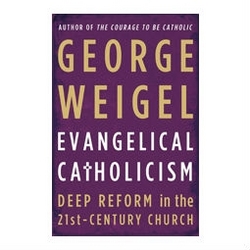 In today's mail I received my copy of George Weigel's latest book, Evangelical Catholicism: Deep Reform in the 21-Century Church (Basic Books, 2013).
In today's mail I received my copy of George Weigel's latest book, Evangelical Catholicism: Deep Reform in the 21-Century Church (Basic Books, 2013).I am already pleased to read a very fine book on the needs of the flourishing of Catholicism again in an era of significant discord viz. the Faith. I hope many will pay attention to what Weigel has to say.
Weigel's pointing to a niche Catholicism that's only now gaining currency in Catholic places. "Niche" in the sense that Catholics are now adopting an approach, a method, a manner of proposing the Truth that is more associated with Evangelical Christians than with Catholicism. We don't always have the confidence and vocabulary to make the Christian proposal to others (to Catholics and non-Catholics alike). But if you think about, we've always been evangelical but we've been shy to share our faith with others in meaningful ways.
Certainly an evangelical approach is Catholic and is being picked up once again as a valid and faithful way of living the Truth. Perhaps our priests, religious, faith formation directors and not a few members of Roman Curia will see this light. It is not lost, however, on Pope Benedict XVI who has espoused an approach to the faith with his great emphasis on the new evangelization and the calling of the Year of Faith. Even some circles of the Orthodox Church have looked to evangelical ways as good and helpful.
Here is Brad Miner's review article published on The Catholic Thing. It's OK. I would have read the book anyway because George Weige's the author. Turning Weigel on himself by quoting Weigel by saying, "He does chicken right." The book is a terrific exposition on what we need in having our face set on the Lord. I would, however, say that Miner does not quite comprehend as fully as he ought what the theology of the Church fathers teach, especially Benedict, in that he seems to have an appreciate the cult of personality of those in the papal office than a relationship has with the Lord. Miner does pick this tendency up from Weigel, I fear. But there are times Weigel does the same. It is a serious flaw if not monitored. We unequivocally need to center on a renewed emphasis on Church reform that is personal first because only then it will effect a true reform/renewal in the Church organization. If I am not personally converted to Christ, then it matters little who pope is. But who is setting the agenda? As Weigel says in the March issue of First Things,
"The internal dynamics of he Church itself, attentive tot eh promptings of the divine Bridegroom and the unique challenges posed to the Great Commission by late modernity and post-modernity, have, together, impelled a new evolution in the Church's self-understanding and self-expression. The result of that evolution, Evangelical Catholicism, is an expression of the four enduring marks of Christian ecclesial life --unity, holiness, catholicity, and apostolicity."
You need to read Deuteronomy in this way: distance yourself from distractions and choose life: life in God; life in the communion of the Trinity. What is clear about Evangelical Catholics insistence on Catholics distancing themselves from confused thinking and acting, being more focused and less mediocre, to work for concrete unity both interiorly and exteriorly, and not to fear persecution.
What Benedict XVI and Weigel point to, therefore, as deep reform has less to do with who is the Bishop of Rome than with a sincere and distinct focus on personal relationship with Jesus Christ. It is Christ who is the protagonist of all history. Catholics have not grasped this fact very well since the Ascension of the Lord. While it is very true that whoever is the pope sets the stage, opens doors and points the way ahead in a manner of true renewal and reform that fearlessly shows us how to live and teach the truth of the Good News. But new faith initiatives are too often rooted in a human project oriented toward gaining numbers and self-indulgent wanna-bees, and not enough on a concrete relationship with the Triune God.
Weigel notes 10 characteristics of evangelical Catholicism (see the article in FT):
1. friendship with the Lord Jesus Christ
2. an affirmation of divine revelation and authority continued in the Church
3. the seven sacraments are divinely given and the means of sanctifying life
4. constant call to conversion, a rejection of evil, and charitable works
5. liturgically centered ecclesial life according to Vatican II
6. biblically centered for the salvation of souls
7. there is a hierarchy --that is, a variety of vocations respected
8. culture-forming and counter-cultural
9. engaged in the public square, a voice of reason, grounded in the Gospel
10. engaged in mission.
By Baptism we are all called to conversion, vocation and mission.


Leave a comment